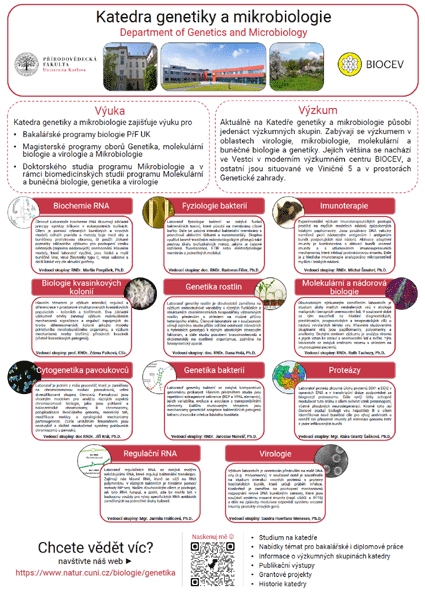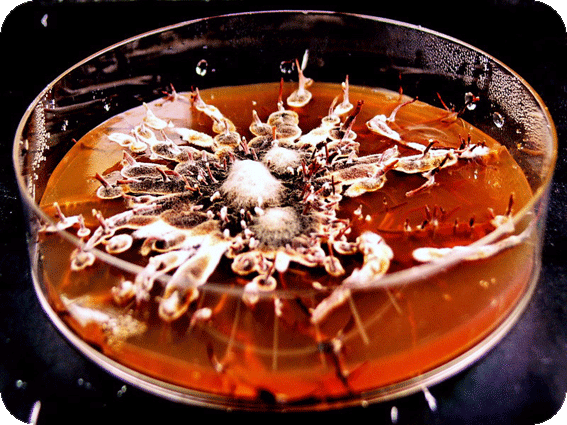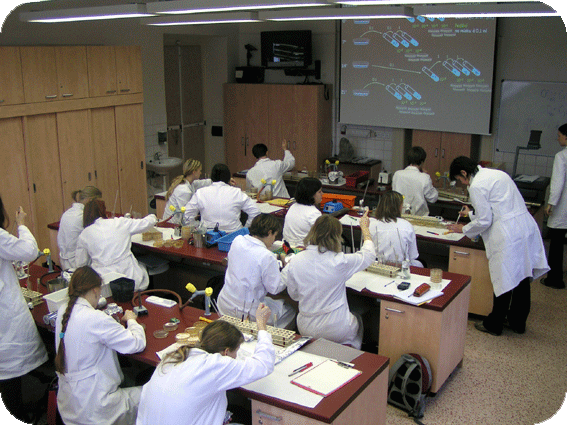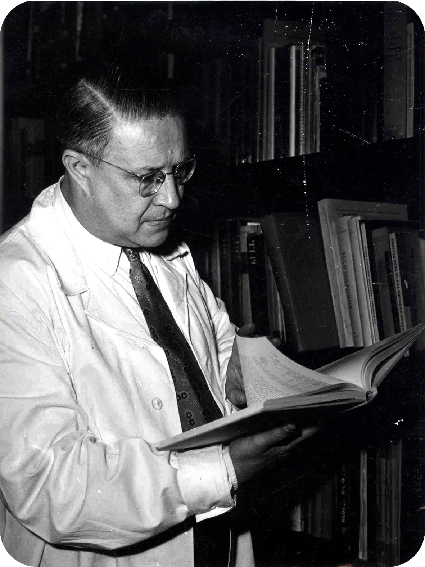Basic Information About the Department of Genetics and Microbiology
Who Are We?
 We are currently one of the largest departments within the Faculty of Science, with over 90 internal members, including 2 professors and 7 associate professors. A full list of internal members and their contact details is available here. The Department naturally also includes students; statistical data on currently enrolled M.Sc. and Ph.D. students can be found here (exact lists are not published due to GDPR guidelines). Each year, 28-29 bachelor's students, 32-33 master’s students, and 17-18 doctoral students successfully defend their theses at the Department (averages over the last 10 years).
We are currently one of the largest departments within the Faculty of Science, with over 90 internal members, including 2 professors and 7 associate professors. A full list of internal members and their contact details is available here. The Department naturally also includes students; statistical data on currently enrolled M.Sc. and Ph.D. students can be found here (exact lists are not published due to GDPR guidelines). Each year, 28-29 bachelor's students, 32-33 master’s students, and 17-18 doctoral students successfully defend their theses at the Department (averages over the last 10 years).
Where to Find Us?
The first part of the Department's research facilities is located in the Faculty of Science campus in Prague 2, Nové Město, in the Viničná 5 building. The second part of our facilities is located at the BIOCEV campus in Vestec near Prague. Floor plans for the relevant sections of these buildings, where the laboratories and offices of Department members and students are located, can be found here: Viničná 5 (1st floor); Viničná 5 (ground floor); Viničná 5 (basement); BIOCEV (1st floor). The Department also includes laboratories and greenhouses in the Brožek´s Genetic Garden (Studničkova N12/Albertov 8) for plant genetics research.
What Do We Study?
 The Department's research activities span various fields, including genetics, molecular and cellular biology, microbiology, virology, physiology, ecology, and systematics. The significant diversity of research projects is reflected in a wide range of organisms studied (viruses, bacteria, yeasts, animals, plants), as well as in the variety of methodological approaches and techniques. Currently, the Department hosts eleven research groups that often collaborate with each other, with other departments of the Faculty of Science, and with numerous research institutions in the Czech Republic and abroad (you can learn more about specific collaborations of individual groups also in the Research section of this website). Research projects are supported by domestic and international grants, and results are regularly published in prestigious scientific journals and monographs. Members and students of the department have also received various awards for their research activities.
The Department's research activities span various fields, including genetics, molecular and cellular biology, microbiology, virology, physiology, ecology, and systematics. The significant diversity of research projects is reflected in a wide range of organisms studied (viruses, bacteria, yeasts, animals, plants), as well as in the variety of methodological approaches and techniques. Currently, the Department hosts eleven research groups that often collaborate with each other, with other departments of the Faculty of Science, and with numerous research institutions in the Czech Republic and abroad (you can learn more about specific collaborations of individual groups also in the Research section of this website). Research projects are supported by domestic and international grants, and results are regularly published in prestigious scientific journals and monographs. Members and students of the department have also received various awards for their research activities.
What Do We Teach?
 The Department’s teaching activities involve providing both fundamental and specialized lectures and practical courses at all levels of higher education, totaling approximately 100 lectures, courses, and seminars each year). Department members also supervise students, particularly those within the three-year bachelor's programmes Biology, and Molecular Biology and Biochemistry of Organisms (both in Czech language only), the two-year follow-up master's programmes Genetics, Molecular Biology and Virology, and Microbiology (also in Czech language only) as well as the doctoral programmes Molecular and Cellular Biology, Genetics, and Virology and Microbiology (in either Czech or English language variants). However, the Department also participates in the Bachelor´s study programme Science offered in English language, and the Master´s Follow-Up study programme Parasitology and Infection Biology (also in English language). More detailed information about the study process within the individual programmes and their specializations, as well as about the lectures and courses provided by the Department, can be found at the Teaching and Study section of this website. Most of our courses are well-received by students, and several Department members have been awarded for their teaching excellence.
The Department’s teaching activities involve providing both fundamental and specialized lectures and practical courses at all levels of higher education, totaling approximately 100 lectures, courses, and seminars each year). Department members also supervise students, particularly those within the three-year bachelor's programmes Biology, and Molecular Biology and Biochemistry of Organisms (both in Czech language only), the two-year follow-up master's programmes Genetics, Molecular Biology and Virology, and Microbiology (also in Czech language only) as well as the doctoral programmes Molecular and Cellular Biology, Genetics, and Virology and Microbiology (in either Czech or English language variants). However, the Department also participates in the Bachelor´s study programme Science offered in English language, and the Master´s Follow-Up study programme Parasitology and Infection Biology (also in English language). More detailed information about the study process within the individual programmes and their specializations, as well as about the lectures and courses provided by the Department, can be found at the Teaching and Study section of this website. Most of our courses are well-received by students, and several Department members have been awarded for their teaching excellence.
How Have We Evolved Over the Years?
 The history of the Department of Genetics and Microbiology is quite eventful. The department was officially established in 1959, but research and teaching in genetics and microbiology at the Faculty of Science at Charles University in Prague (before 1921 at the Faculty of Philosophy) had already been ongoing since the early 20th century within the Institute of Plant Anatomy and Physiology, and later within the Genetics and Microbiology Institute of the Faculty. The research activities of these institutes were primarily focused on plant genetics and cytogenetics, hydromicrobiology, symbiotic and antagonistic relationships of bacteria, and more. Two of the current research groups in the department (the Laboratory of Plant Genetics and the Laboratory of Bacterial Physiology) continue this work to some extent, although their research focus has significantly changed over the years.
The history of the Department of Genetics and Microbiology is quite eventful. The department was officially established in 1959, but research and teaching in genetics and microbiology at the Faculty of Science at Charles University in Prague (before 1921 at the Faculty of Philosophy) had already been ongoing since the early 20th century within the Institute of Plant Anatomy and Physiology, and later within the Genetics and Microbiology Institute of the Faculty. The research activities of these institutes were primarily focused on plant genetics and cytogenetics, hydromicrobiology, symbiotic and antagonistic relationships of bacteria, and more. Two of the current research groups in the department (the Laboratory of Plant Genetics and the Laboratory of Bacterial Physiology) continue this work to some extent, although their research focus has significantly changed over the years.
The period after World War II was a challenging time for genetics in the Czech Republic, marked by severe persecution. However, through various unofficial means (thanks largely to Professor Karel Hrubý), the discipline managed to survive at the faculty. In the 1960s, the department established research in the genetics of hymenomycetes and experimental mutagenesis in bacteria, although these topics eventually faded away by the late 20th century. In the following decade, the Department expanded to include a biophysics division, which focused on studying the bacterial cell cycle, radiation damage to nucleic acids, and possibilities for their repair. Conversely, the Department lost its focus on animal genetics. The biophysics division and its research focus also ended by the late 20th century.
In the late 1970s, a group focusing on yeast biology was established within the Department, primarily exploring the possibilities of genetic manipulation of yeasts for industrial applications. Although the research focus of this group has changed over time, it has partly continued through today's Laboratory of Yeast Colony Biology. Other microbiological topics began to be addressed within the Laboratory of Bacterial Genetics, which has undergone a tumultuous history but has now reestablished itself as an independent research group within the Department. Since the mid-1980s, in collaboration with the Institute of Molecular Genetics of the Czechoslovak Academy of Sciences, molecular biology topics have been significantly developed, with microorganisms again being the primary models. This led to the creation of the Laboratory of RNA Biochemistry. In the 1990s, virology became an independent research focus, which continues to develop primarily within the Laboratory of Virology. Cytogenetics research also took a completely new direction at that time, now represented by the Laboratory of Arachnid Cytogenetics.
Since 2015, more than half of the Department has been involved in research projects at the Biotechnology and Biomedicine Center of the Academy of Sciences of the Czech Republic and Charles University (BIOCEV) in Vestec near Prague. That year, the Department also expanded with two new virology-focused groups (the Laboratory of Molecular and Tumor Virology and the Laboratory of Immunotherapy, whose members joined the Department from the Institute of Hematology and Blood Transfusion). The following year, another group partially based at the Institute of Organic Chemistry and Biochemistry of the Czech Academy of Sciences joined (the Laboratory of Proteases).
The newest research group is the Laboratory of Regulatory RNAs, which became part of the Department in 2023, strengthening the Department's focus on bacterial research (its members originally worked at the Institute of Microbiology of the Czech Academy of Sciences).
You can learn more about the Department's history (and general history of genetics and microbiology teaching and research at the Faculty of Science, Charles University) here.





















